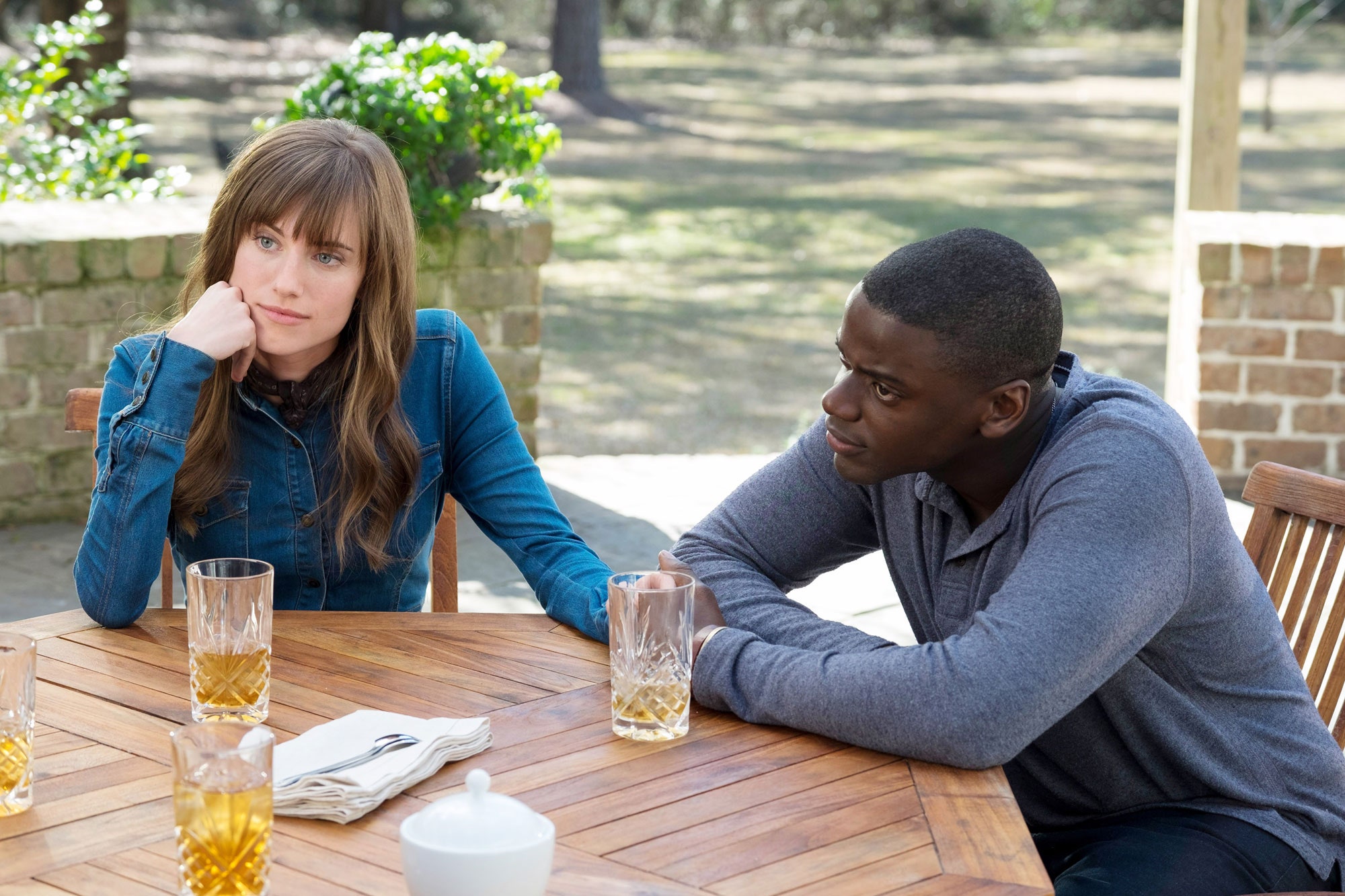Jordan Peele’s debut feature Get Out is the first terrific commercial movie of 2017, a smart, inventive and consistently surprising social critique disguised as a commercial horror film that both provokes and entertains in equal measures.
It’s been nearly fifty years since Stanley Kramer’s Guess Who’s Coming to Dinner examined similar territory, Katherine Hepburn and Spencer Tracy navigating the cultural and personal minefields of Sidney Poitier’s engagement to their daughter. And while Get Out’s parental reactions to a daughter’s Black suitor may have changed—the movie revels in scenes of comic political correctness—the ultimate conclusion in this 2017 satire is much, much grimmer.
When aspiring Manhattan photographer Chris (Daniel Kaluuya) dives headfirst into the necessary dating ritual of meeting girlfriend Rose’s (Allison Williams) parents Dean (Bradley Whitford) and Missy (Catherine Keener) Armitage, his trepidations about being Black in an all-white, leafy suburban enclave are quickly put to rest by their ultra-liberal embrace.
This first part of the film sets up a believable relationship with two likable young people and a knowing comedy of manners, here those of well-meaning libs striving for hip cred by claiming allegiance to President Obama, reverence to Jesse Owens and an overuse of the word “man,” concluding every sentence.
For Chris, the tony, upstate burb is both welcoming and more than a little creepy, especially upon the arrival of Rose’s aggressive brother (Caleb Landry Jones), itching for a brawl with her sister’s beau, whom he praises as genetically superior. Uh-huh.
The family’s two loyal servants are Black as well, each firmly rooted in a Twilight Zone of increasingly bizarre behavior. Perma-smile, auto-pilot maid Georgina (Betty Gabriel) and gardener Walter (Marcus Henderson) wax on about job fulfillment while appearing to be elaborate, wind-up marionettes with only a flickering sense of displacement.
Things take a turn when Missy, a psychiatrist specializing in hypnotherapy, convinces Chris to go under. A sure-fire fix for his smoking habit? Maybe, but when he gets to “the sunken place,” a painful childhood trauma bubbles to the fore.
Stranger still, the neighborhood clan shows up for an annual, one-percenter garden party, where Chris becomes a novelty to all manner of clueless inquiries from the wealthy, white retireds who just can’t resist making allusions to his virility.
Back in Manhattan, Chris’s best friend Rod (Lil Rel Howery), a TSA agent with a comic Napoleon complex and vivid imagination, becomes increasingly suspicious, leading to a pair of sustained comic scenes, involving tastelessly funny Jeffrey Dahmer jokes and a police report filing that achieves a rare level of comic lunacy.
Peele, with a very firm grasp on tonal shifts from comedy to thrills, witty satire to broad jokes, has delivered a most impressive—and highly unsettling—commentary on white privilege, white guilt, the dynamics of white power, a vision of enslavement that pulls no punches.
Get Out presents a savage portrait of cultural and social dominion and a clear statement about white power, here driven by the need to subjugate Blacks, deemed worthy only for their physical prowess. Even more surprising is that the movie suggests such beliefs perhaps lie in the hearts of liberals; it isn’t a movie that indicts the mores of the Deliverance backwoods, instead taking aim at educated elites harboring burrowed deep contradictions—strong stuff for a mainstream American picture, and strongly incisive, all wrapped up in a commercially palatable package.
When the horror comes, the movie’s thrills aren’t as much those of the Grand Guignol variety (though the picture does deliver the requisite goods in the final reel) but rather those of a queasy, uneasy sense of rising dread that makes us squirm not by deploying genre tropes but instead by forcing us to wrestle with a picture-perfect, affluent family comfortable with the idea of bondage and exploitation.
Get Out is a radical movie, and one that comes at a moment in America where it couldn’t be more relevant.
3 1/2 stars.



